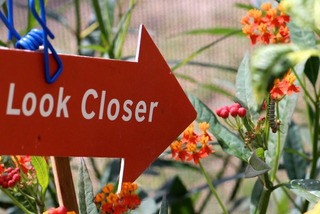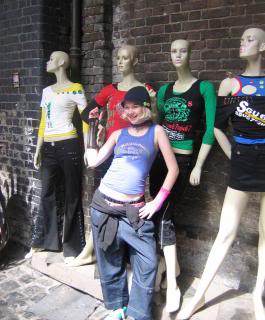





It's pretty common for someone to worry that a child "has no interest," or conversely to assume that a childhood interest means parents should focus there and shepherd the child to a career in paleontology or rock and roll or whatever.
In response to a question about "real interests," Pam Sorooshian wrote about some of her own childrens' interests over the years:
The Question:
In my view at that time, interest was something that pre-existed "in" children, and you had to find the real ones vs the momentary ones. In your view, what is the origination of interest?Pam's response:
I wouldn't mind having an esoteric discussion of the origin of interest, but, really it is not a practical or useful thing to do to help you or others unschool. I say this because it really doesn't MATTER what the origin of interest is—our role as unschooling parents is to observe and support and offer lots of potentially interesting options, not to figure out where it comes from.Instead of thinking there are real interests versus momentary ones (as if those momentary ones are not also real or true), our time and energy are better spent encouraging and supporting the interests that our kids actually do have.
Picture a large piece of paper with circles of all sizes drawn all over it. Each circle represents an interest. A kid moves from circle to circle—they are like stepping stones. The child creates his or her own path by moving from one stepping stone to another. Some are part of a path that goes straight to some ultimate goal or achievement, others are part of paths that meander and let the person have a variety of experiences. Some are part of paths that twist and turn. Sometimes the kid sits on one of them for a really long time. Sometimes the path leads away from the current interest to something seemingly unrelated. And so on.
Looking back, we can often see the path pretty clearly. But we can't look ahead and know what the path is going to be.
I know a guy (he's in his late 20's, maybe even 30) who was homeschooled, mostly unschoolishly, and he loved history. LOVED it. His family used to go to garage and estate sales and library sales and he'd search for history books - one of is favorite things to do was read about one period of history, in history books written at different times, and compare their treatment of that time period. He was super into all this for many years. And then he just dropped it in his late teens and decided to pursue engineering. He studied a bunch of formal math, on his own, and got into a prestigious engineering college and has had a wonderful career already.
Where did his interest in history come from? Where did his interest in engineering come from? Does it matter?
My own daughter, who spent all her teen years very focused on ceramics, working in a ceramics studio and in a clay and glaze manufacturing company, got a college degree in recreation and work running programs for adults with developmental disabilities and now is in the process of applying to grad school to become a marriage and family therapist. I can see, looking back, how one thing led naturally and logically to another—but certainly could never have predicted the path.
My daughter always loved to play in mud and sand and water. I made homemade playdough very very often—once or more each week—when she was a kid. And I put weird things in it—oatmeal and pineapple flavoring, etc. She fingerpainted with pudding in the bath tub. Where did those interests come from? I don't see why it matters. What matters is that playing around with clay and playdough and fingerpaints and other goopy, soft stuff gave her pleasure so I offered more opportunities to do more of it in lots of different ways.
Pam Sorooshian
March 2009
Unschooling is about learning, exploration, peace and love. It shouldn't be about pressure, shame and failure.








